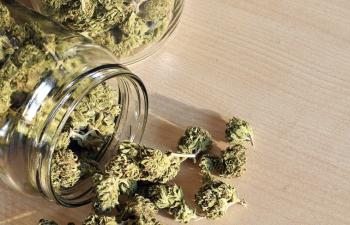Florida Gov. Ron DeSantis (R) went on a bit of a social media tirade on Wednesday, taking aim at a campaign working to put a marijuana legalization initiative on the state’s 2026 ballot and dismissing the idea that the reform could generate significant tax revenue by pointing to Colorado’s experience with cannabis.
The Democratic governor of Colorado, Jared Polis, took notice and responded in kind.
After DeSantis claimed that legalizing marijuana in Colorado has resulted in “an increase in the black market” since voters approved the reform there—while also asserting that tax revenue from cannabis has “fallen dramatically”—Polis hit back.
“Colorado has collected over $3B in marijuana tax revenue to pave roads, build schools, rec centers and so much more, all while successfully cracking down on the underground market,” he said.
Colorado has collected over $3B in marijuana tax revenue to pave roads, build schools, rec centers and so much more, all while successfully cracking down on the underground market. Oh, and we didn’t use $50M in taxpayer dollars to block access to freedom. But you do you. https://t.co/DqPVk8PpTu
— Jared Polis (@jaredpolis) November 12, 2025
“Oh, and we didn’t use $50M in taxpayer dollars to block access to freedom. But you do you,” Polis added, referencing the DeSantis administration’s allegedly illegal diversion of Medicare funds to amplify anti-legalization messaging ahead of a vote on a legalization initiative on Florida’s 2024 ballot.
Meanwhile, the Florida governor additionally said that a pending 2026 legalization measure in his state is as an attempt to benefit corporate cannabis companies that he said is “vulnerable” to being invalidated by the state Supreme Court.
Reacting to an X post about a recent poll showing that nine in 10 Florida voters believe they should have the right to decide on cannabis reform, the governor said it’s “the corporate weed oligarchy telling you they won’t take ‘no’ for an answer.”
That’s a reference to the fact that the campaign is making another attempt after a majority of Floridians voted in favor of a legalization proposal at the ballot last year that nonetheless failed to reach a 60 percent threshold to pass a constitutional amendment.
It’s the corporate weed oligarchy telling you they won’t take “no” for an answer. https://t.co/CZFXwvtEeD
— Ron DeSantis (@RonDeSantis) November 12, 2025
DeSantis also replied to a post about perceived legal weaknesses in an abortion rights initiative that made the 2024 ballot, stating that there were similar concerns with the marijuana measure, known as Amendment 3. He claimed the proposal “granted total immunity from civil liability to big weed companies, yet the ballot summary (which is what the voter sees on the ballot) completely omitted that.”
“Should have been nixed by the Court on that ground alone,” he said.
And Amendment 3 — the text of the amendment (which is not on the ballot) granted total immunity from civil liability to big weed companies, yet the ballot summary (which is what the voter sees on the ballot) completely omitted that.
Should have been nixed by the Court on that… https://t.co/umEIRBBZZW
— Ron DeSantis (@RonDeSantis) November 12, 2025
“The ballot language would still have to pass Supreme Court review—the way it is written is vulnerable to challenge on multiple fronts,” he said in another post on Wednesday.
“Plus, there is an ongoing investigation into petition fraud and they might not have enough verified petitions,” the governor said.
The ballot language would still have to pass Supreme Court review — the way it is written is vulnerable to challenge on multiple fronts.
Plus, there is an ongoing investigation into petition fraud and they might not have enough verified petitions. https://t.co/T0Yw95Zs7q
— Ron DeSantis (@RonDeSantis) November 12, 2025
DeSantis on Thursday also replied to a user who posited that the alcohol lobby is influencing the administration’s anti-marijuana agenda.
“I wouldn’t know but I know [the industry’s contributions] would be a small fraction of the $150 million that the corporate marijuana lobby poured into the state to try to amend the state’s constitution,” he said.
I wouldn’t know but I know it would be a small fraction of the $150 million that the corporate marijuana lobby poured into the state to try to amend the state’s constitution. https://t.co/YUoIvODLFY
— Ron DeSantis (@RonDeSantis) November 12, 2025
There’s significant uncertainty about the prospects of the campaign Smart & Safe Florida’s 2026 legalization initiative, which is currently pending a legal and fiscal review before potentially securing ballot placement.
DeSantis’s comments about an “ongoing investigation into petition fraud” is one of the complicating factors, with the Florida Department of Law Enforcement (FDLE) taking steps over recent months to prosecute individuals suspected of circulating “fraudulent petitions” for the cannabis measure.
Meanwhile, Smart & Safe Florida recently filed a lawsuit with the state Supreme Court, alleging that officials are violating election laws by stalling a required review process for the measure without justification.
With 662,543 signatures verified by the secretary of state’s office so far, that’s more than triple the 220,016 required to prompt the review. The campaign reached that initial threshold over the summer and notified state officials, but it says it received no response.
Attorneys for the campaign also noted that Smart & Safe Florida is involved in other litigation related to allegations that the state is taking “unlawful” steps to force the invalidation of about 200,000 voter signatures it has submitted. Officials claim the signatures are void because the petitions voters signed didn’t include the full text of the initiative.
Meanwhile, DeSantis’s X post about Colorado’s marijuana legalization law that drew the retort from Polis came in response to a user who pointed out the potential tax revenue benefits of enacting a system of regulated cannabis sales.
As he’s done in the past, the governor used the opportunity to take a swipe at Colorado, one of the first two states to legalize adult-use cannabis. He argued that marijuana tax dollars have “fallen dramatically in recent years—largely because imposing taxes makes the black market marijuana more economical. Hence, why states like CO have seen an increase in the black market, not an elimination of it.”
Well, that has not been the experience in Colorado. The tax revenue from marijuana sales has fallen dramatically in recent years — largely because imposing taxes makes the black market marijuana more economical.
Hence, why states like CO have seen an increase in the black… https://t.co/L28FnIOMo4
— Ron DeSantis (@RonDeSantis) November 12, 2025
While tax revenue has leveled out in Colorado in recent years as the market matured and other states opted to legalize, thereby reducing sales from out-of-state visitors, the point about the illicit market the governor is making has been challenged by studies and economic analyses.
To be sure, it’s well-understood that enacting legalization doesn’t fully eliminate the illicit market—and states have had varying degrees of success to that end—but research indicates that Colorado has been among the most effective at transitioning people to the legal marketplace.
For example, one report from Leafly and Whitney Economics that was published in 2022 found that nearly all (99 percent) recreational marijuana sales in Colorado now take place at licensed retailers.
Last year, DeSantis also said that most people in Colorado regret legalizing marijuana—despite polling results showing otherwise.
In response to DeSantis’s attacks on his state’s cannabis program, Colorado Gov. Jared Polis (D) said last year that he’d be “happy” to explain the advantages of legalization if his Florida counterpart needed an education on the issue.
DeSantis’s role in trying to influence the vote on marijuana reform has been the subject of scrutiny at the state and federal level.
In March, for example, two Democratic members of Congress representing Florida asked the federal government to investigate what they described as “potentially unlawful diversion” of millions in state Medicaid funds via a group with ties to the governor. The money was used to fight against a citizen ballot initiative, vehemently opposed by DeSantis, that would have legalized marijuana for adults.
The lawmakers’ letter followed allegations that a $10 million donation from a state legal settlement was improperly made to the Hope Florida Foundation, which later sent the money to two political nonprofits, which in turn sent $8.5 million to a campaign opposing Amendment 3.
Meanwhile, in the background of the ongoing litigation and investigations concerning the 2026 cannabis initiative, a federal judge in August delivered a win to Smart & Safe Florida—granting “complete relief” from provisions of a law the governor signed to impose other serious restrictions on signature gathering.
While the law DeSantis signed in May wasn’t directly targeted at the cannabis initiative, there’s been concern among supporters that it could jeopardize an already complex and costly process to collect enough signatures to make the ballot. That’s because it would block non-residents and non-citizens from collecting signatures for ballot measures.
The governor said in February that the newest marijuana legalization measure is in “big time trouble” with the state Supreme Court, predicting it will be blocked from going before voters next year.
“There’s a lot of different perspectives on on marijuana,” DeSantis said. “It should not be in our Constitution. If you feel strongly about it, you have elections for the legislature. Go back candidates that you believe will be able to deliver what your vision is on that.”
“But when you put these things in the Constitution—and I think, I mean, the way they wrote, there’s all kinds of things going on in here. I think it’s going to have big time trouble getting through the Florida Supreme Court,” he said.
The latest initiative was filed with the secretary of state’s office just months after the initial version failed during the November 2024 election—despite an endorsement from President Donald Trump.
Smart & Safe Florida is hoping the revised version will succeed in 2026. The campaign—which in the last election cycle received tens of millions of dollars from cannabis industry stakeholders, principally the multi-state operator Trulieve—incorporated certain changes into the new version that seem responsive to criticism opponents raised during the 2024 push.
For example, it now specifically states that the “smoking and vaping of marijuana in any public place is prohibited.”Another section asserts that the legislature would need to approve rules dealing with the “regulation of the time, place, and manner of the public consumption of marijuana.”
Last year, the governor accurately predicted that the 2024 cannabis measure from the campaign would survive a legal challenge from the state attorney general. It’s not entirely clear why he feels this version would face a different outcome.
While there’s uncertainty around how the state’s highest court will navigate the measure, a poll released in February showed overwhelming bipartisan voter support for the reform—with 67 percent of Florida voters backing legalization, including 82 percent of Democrats, 66 percent of independents and 55 percent of Republicans.
—
Marijuana Moment is tracking hundreds of cannabis, psychedelics and drug policy bills in state legislatures and Congress this year. Patreon supporters pledging at least $25/month get access to our interactive maps, charts and hearing calendar so they don’t miss any developments.
![]()
Learn more about our marijuana bill tracker and become a supporter on Patreon to get access.
—
Meanwhile, a pro-legalization GOP state lawmaker recently filed a bill to amend state law to codify that the public use of marijuana is prohibited.
Rep. Alex Andrade (R), the sponsor, said earlier this year that embracing cannabis reform is a way for the Republican party to secure more votes from young people.
Separately, Florida medical marijuana officials are actively revoking the registrations of patients and caregivers with drug-related criminal records. The policy is part of broad budget legislation signed into law earlier this year by DeSantis. The provisions in question direct the state Department of Health (DOH) to cancel registrations of medical marijuana patients and caregivers if they’re convicted of—or plead guilty or no contest to—criminal drug charges.
The post Colorado Governor Hits Back At DeSantis Over Claims Marijuana Legalization Is Failing appeared first on Marijuana Moment.




















